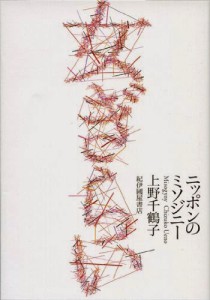2015.02.28 Sat
Chizuko’s Blog No.82
February 9th, 2015
A Chinese translation (in the simplified Chinese characters) of my book “Woman-Haters” has been published. I have learned the Chinese title is 『厭女症』(Woman-Hater Syndrome). The following is what I wrote as the foreword for this Chinese edition. Also a Korean translation is now under way.
“Woman-Haters: Misogyny in Japan”
Written by Chizuko Ueno
(Kinokuniya Shoten, 6/10/2010)
*************************************
I’m happy to find that they have decided to translate my book “Woman-Haters.” The subtitle of the book is “Misogyny in Japan,” and I believe we can apply this idea to many different societies — “Misogyny in China,” “Misogyny in Korea,” or “Misogyny in Vietnam,” for example. In the first place, in writing this book, I was inspired by “Between Men: English Literature and Male Homosocial Desire,” a work by Eve Sedgwick, an American scholar in gender studies and English literature. So, obviously, we could also have “Misogyny in Britain” and “Misogyny in America.” Unfortunately, it is difficult to imagine a society without misogyny.
This book consists of a theory and its practice. The triad of homosociality, homophobia and misogyny — a theoretical apparatus which Sedgwick provided us — is very useful. Thanks to this theory, we can understand how different homosociality and homosexuality are and why homosexual males tend to be “feminized.” And above all, we learned from her theory that masculinity is defined as “not being (like) a woman,” which means putting women outside of men.
Because this theoretical apparatus is so sharp-cutting you are tempted to cut what you have using it. Like “Oh, yes, that group is homosocial,” or “Now I understand that womanizer is in fact a woman-hater.” And as in Japan today, so also in China, you will find there are so many situations you can easily explain with this theoretical apparatus. That is a shame, since it reflects the fact that men are not willing to change at all.
“Women support half of heaven,” was a wonderful phrase that we learned from socialist China. However, what we have heard after their “Reform and Liberation” are only stories no better than those in capitalist countries, including companies’ preference for men and a job shortage for women. I was astounded when I learned of a phenomenon called 婦女回家 (women returning home) in China. While Japanese women want to escape from being housewives, do Chinese women really want to do the opposite and go back home and become full-time housewives? The change of society is full of contradictions. Apparently, the difficulties women are suffering from in their lives are the same in all countries and under all political systems. China has its own misogyny.
As you know, the Japanese language has developed as a kind of creole by importing foreign languages like Chinese and English. You can see that in the mixture of hiragana (original Japanese phonetic characters), kanji (adopted Chinese characters), and katakana (phonetic characters used in describing loanwords from foreign languages) in written Japanese. Thus, the Japanese language has historically imported foreign ideas quite freely. But at the same time, it has failed to translate those ideas to Japanese. In Japan, the word “feminism” or “misogyny” has been accepted as a katakana loanword as it is. Meanwhile, in China, “feminism” is called 女性主義 (women-ism) and “women’s center” is called 女性中心 (women-center), which impressed me. Also, I was deeply impressed to learn that this book of mine would be translated as 『厭女症』 (“Woman-Hater Syndrome”). If it is a “syndrome,” it should be a distinct medical disorder. Then, how differently would “homosocial” and “homosexual” be translated? I’m all curiosity.
This disorder of woman-hater syndrome affects not only men but also women. An advantage of the idea of misogyny is that it can explain the dark side of women too. As I explained in the book, women’s misogyny is much more troublesome than men’s, because it can turn to self-hatred. If we realize this, we may solve many problems including why women could be easily divided and have conflicts over men, why there is a saying “Women’s enemies are other women,” or why mother-daughter relationships often tend to be awkward. Well, curing the disorder would not be so easy, but to realize the fact can at least be the first step.
Feminism in Japan has been influenced by many foreign countries. This book also has been influenced by Sedgwick, an American scholar in queer theory, as I stated above. And some people say that Japanese feminism is no more than an import from abroad. But I would like to counter this argument with a quote from Gayatri Spivak, a well-known scholar in post-colonial studies, who was born in India, studies English literature, has permanent U.S. residency, and teaches at Columbia University in New York. When she visited Japan to attend a symposium on gender theory, a Western scholar asked her if “gender” was not an idea which did not originally exist in Japan. Then she replied, “No matter where an idea was generated, if it is useful, you should use it.”
When a theory is applied to practice, it is customized according to the places, subjects and contexts it deals with. For readers of the book, it would be hard not to apply the theory to their own societies, to try to solve the problems they have. As I discussed misogyny in Japan, I expect some Chinese readers will probably discuss misogyny in China in the near future. I hope I can read their books in Japanese translation. And what if there are any phenomena this theory cannot explain? I should welcome them as a sign that society is getting away from misogyny.
———————————————————————
カテゴリー:Book (B-WAN) / Other







![[広告]広告募集中](https://wan.or.jp/assets/front/img/side_ads-call.png)











